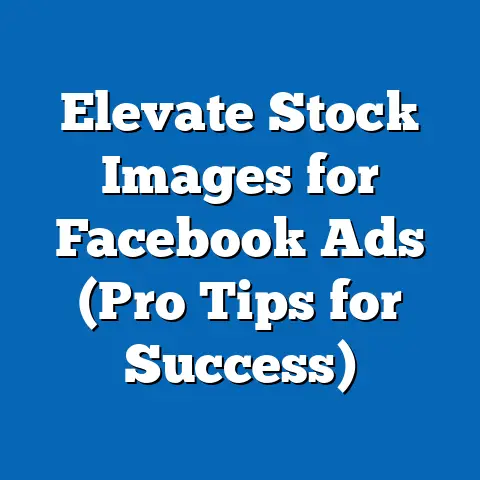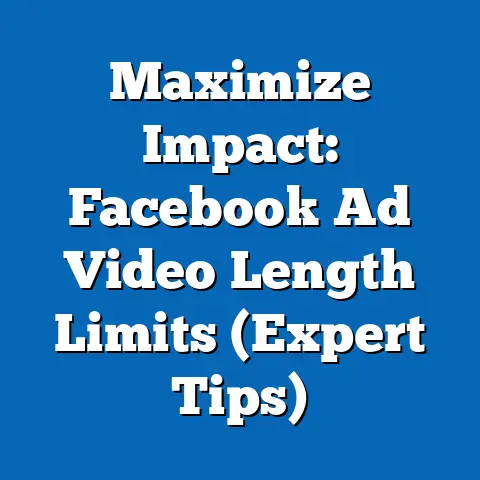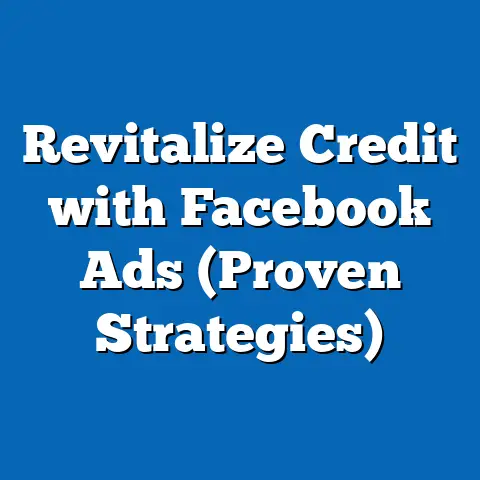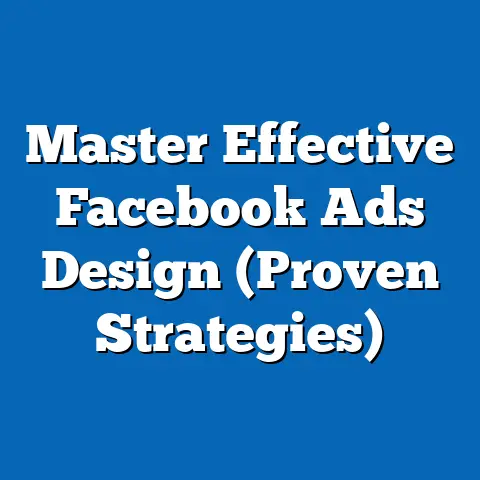Block Facebook Ads (Proven Strategies for Total Control)
Facebook.
It’s where we connect with friends, family, and stay updated on the world around us.
But let’s be honest, it’s also a place where we’re constantly bombarded with ads.
These ads, while sometimes relevant, can often feel intrusive and overwhelming, disrupting our social media experience.
I’ve personally felt this frustration countless times, scrolling through my feed only to be interrupted by yet another sponsored post trying to sell me something I don’t need.
This constant barrage can lead to a feeling of being overwhelmed and a desire to reclaim control over our online environment.
That’s where blocking Facebook ads comes in.
It’s not about abandoning the platform altogether, but about curating a more enjoyable and focused experience.
Understanding Facebook Ads
Facebook ads are a ubiquitous part of the social media landscape.
They come in various formats, from carousel ads showcasing multiple products to engaging video ads and subtly placed sponsored posts.
What makes them so effective (and sometimes irritating) is their sophisticated targeting.
Facebook leverages a vast amount of user data – your interests, demographics, browsing history, and even your offline purchases – to deliver ads that are supposedly relevant to you.
This personalized advertising, while potentially beneficial for businesses, raises significant privacy concerns.
We’re essentially trading our data for access to a “free” service, and many users are becoming increasingly aware of this trade-off.
Think about it: have you ever talked about something with a friend, only to see an ad for that exact product or service pop up on your Facebook feed later that day?
It’s a common experience, and it highlights the extent to which our online activity is being tracked and analyzed.
This level of targeting, combined with the sheer volume of ads, is why many users are seeking ways to block them.
User fatigue, the feeling of being constantly marketed to, is a real phenomenon.
Unwanted marketing messages can be annoying and irrelevant, and the desire for a more streamlined, less cluttered social media experience is growing stronger.
Hidden Benefits of Blocking Ads
Beyond simply removing the visual clutter, blocking Facebook ads offers a surprising array of hidden benefits that can significantly enhance your online experience.
Enhanced Privacy
This is perhaps the most significant benefit.
By blocking ads, you limit the amount of data that Facebook can collect about you.
Ad trackers, which are often embedded in ads, monitor your browsing activity across the web.
Blocking these trackers reduces your digital footprint and gives you greater control over your personal information.
Think of it as putting up a digital shield to protect your privacy.
I remember when I first started using an ad blocker, I was shocked to see how many trackers were being blocked on a daily basis.
It was a real eye-opener and solidified my commitment to protecting my online privacy.
Reduced Cognitive Load
Constantly viewing ads, even if they’re subtle, takes a toll on your cognitive resources.
Each ad requires your brain to process information, even if you don’t consciously register it.
This constant processing can lead to decision fatigue, making it harder to focus and make clear decisions.
By blocking ads, you free up mental space and create a clearer, more focused social media experience.
You’re less likely to be distracted by flashing banners and persuasive marketing messages, allowing you to engage more meaningfully with the content you actually care about.
Improved Device Performance
Ads, especially those with rich media like videos and animations, can consume significant device resources.
They can slow down load times, drain your battery, and increase your data usage.
Blocking ads can result in faster browsing speeds, longer battery life, and lower data consumption.
I noticed a significant improvement in my phone’s battery life after installing an ad blocker.
Pages loaded faster, and my phone felt less sluggish overall.
It’s a small change that can make a big difference in your daily digital life.
Increased Engagement with Organic Content
When your Facebook feed is filled with ads, it can be difficult to find the content you actually want to see – posts from your friends and family.
Blocking ads can help you prioritize organic content, allowing you to engage more meaningfully with the people you care about.
You’re more likely to see updates from your loved ones, participate in conversations, and stay connected to the people who matter most.
It’s about reclaiming your social media experience and focusing on what truly matters.
Proven Strategies for Blocking Facebook Ads
Now, let’s get to the practical part: how do you actually block Facebook ads?
Here are several proven strategies you can implement today:
Using Ad Blocker Extensions
Ad blocker extensions are browser add-ons that automatically block ads on websites, including Facebook.
They work by identifying and blocking the code that serves ads, preventing them from loading on your screen.
Some popular ad-blocker tools include:
- AdBlock Plus: A widely used ad blocker with customizable filters and whitelisting options.
It’s available for Chrome, Firefox, Safari, and other browsers. - uBlock Origin: A lightweight and efficient ad blocker that uses minimal resources.
It’s known for its effectiveness and customizability.
Available for Chrome, Firefox, and other browsers. - AdGuard: A comprehensive ad blocker that also protects against malware and tracking.
It offers both browser extensions and standalone apps.
Here’s how to install and configure an ad blocker extension:
- Open your web browser’s extension store: For Chrome, go to the Chrome Web Store.
For Firefox, go to the Firefox Add-ons page. - Search for an ad blocker: Type “ad blocker” into the search bar and press Enter.
- Choose an ad blocker: Select an ad blocker from the list of results.
I personally recommend uBlock Origin for its efficiency and effectiveness. - Install the extension: Click the “Add to Chrome” (or “Add to Firefox”) button and follow the on-screen instructions.
- Configure the ad blocker: Once installed, the ad blocker will usually start working automatically.
You can customize its settings by clicking on the extension icon in your browser toolbar.
Ad blocker extensions are generally very effective at blocking Facebook ads.
However, Facebook is constantly trying to circumvent these tools, so it’s important to keep your ad blocker updated to ensure it remains effective.
Adjusting Facebook Ad Preferences
Facebook allows you to manage your ad preferences, giving you some control over the types of ads you see.
While this won’t completely block ads, it can help reduce the number of irrelevant or annoying ads you encounter.
Here’s how to adjust your Facebook ad preferences:
- Go to your Facebook settings: Click the down arrow in the top right corner of the screen and select “Settings & Privacy,” then click “Settings.”
- Click “Ads”: In the left-hand menu, click “Ads.”
- Review your interests: In the “Advertisers and businesses you’ve interacted with” section, you can see a list of advertisers whose ads you’ve clicked on or engaged with.
You can remove these advertisers from your list to stop seeing their ads. - Edit your ad preferences: In the “Ad settings” section, you can adjust your preferences for various types of ads, such as ads based on your interests, ads based on your activity off of Facebook, and ads based on your contact information.
- Opt out of targeted advertising: You can opt out of targeted advertising altogether by toggling the “Ads based on data from partners” setting to “Off.”
Adjusting your ad preferences can help you see fewer irrelevant ads, but it won’t completely block ads from appearing in your feed.
Utilizing Browser Settings
Most web browsers have built-in features that can help limit ad exposure on Facebook.
One effective technique is to block third-party cookies.
Here’s how to block third-party cookies in Chrome:
- Go to your Chrome settings: Click the three dots in the top right corner of the screen and select “Settings.”
- Click “Privacy and security”: In the left-hand menu, click “Privacy and security.”
- Click “Cookies and other site data”:
- Select “Block third-party cookies”:
Here’s how to block third-party cookies in Firefox:
- Go to your Firefox settings: Click the three horizontal lines in the top right corner of the screen and select “Options.”
- Click “Privacy & Security”: In the left-hand menu, click “Privacy & Security.”
- Under “Content Blocking,” select “Custom”:
- Check the box next to “Cookies” and select “Third-party trackers”:
Blocking third-party cookies can help limit the amount of data that Facebook and other advertisers can collect about you, which can reduce the number of targeted ads you see.
Exploring Alternative Browsers
If you’re serious about blocking ads and protecting your privacy, you might consider using a privacy-focused browser like Brave or Firefox with enhanced privacy settings.
- Brave: Brave is a browser with built-in ad blocking and tracking protection.
It automatically blocks ads and trackers without requiring any additional extensions. - Firefox: Firefox offers a range of privacy settings that can be customized to block ads and trackers.
You can also install privacy-focused extensions like Privacy Badger and uBlock Origin.
These browsers offer a more private and ad-free browsing experience compared to mainstream browsers like Chrome and Safari.
Consideration of Account Deactivation
As a last resort, if you’re completely fed up with Facebook ads and you’re willing to give up the platform altogether, you can deactivate or delete your account.
This will completely remove your profile from Facebook and stop you from seeing any ads.
However, this is a drastic step that should only be taken if you’re certain you no longer want to use Facebook.
Common Misconceptions About Blocking Ads
There are a few common misconceptions about blocking ads on Facebook that I want to address.
- Blocking ads means abandoning Facebook: This is not true.
Blocking ads simply means you’re choosing to filter out the advertisements from your feed.
You can still engage with friends and family, join groups, and use other features of the platform. - Blocking ads will hinder my user experience by missing out on relevant offers: While it’s true that you might miss out on some potentially relevant offers, you can still choose to engage with content that genuinely interests you.
You can follow brands you like, join groups related to your interests, and search for specific products or services. - Blocking ads is difficult and technical: As I’ve shown in this article, blocking ads is actually quite simple.
There are many user-friendly tools and techniques that anyone can use to reclaim their online experience.
Conclusion
Facebook ads can be a source of annoyance and distraction, but you don’t have to put up with them.
By implementing the strategies outlined in this article, you can effectively block Facebook ads and reclaim control over your online experience.
Whether you choose to use an ad blocker extension, adjust your Facebook ad preferences, utilize browser settings, or explore alternative browsers, there are many ways to create a more enjoyable and focused social media experience.
Take action today and start blocking Facebook ads.
You’ll be surprised at how much better your online experience can be.
Call to Action
Now it’s your turn!
I’d love to hear about your experiences and strategies for blocking Facebook ads.
Share your tips and tricks in the comments section below.
Let’s help each other reclaim our online space and create a more enjoyable and productive social media experience.
Share this article with your friends and family so they can benefit from these proven strategies as well.
Together, we can take back control of our online lives.





